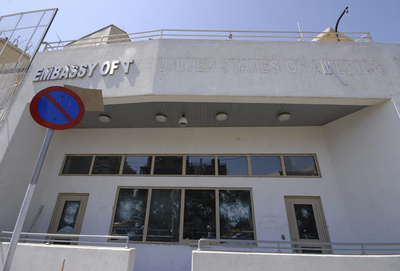UPDATES
US belatedly condemns Syria as Assad flaunts Western concerns
July 12, 2011 | Daniel Meyerowitz-Katz

This blog has been following the baffling hesitation that the West has been showing towards making criticisms of the Assad regime in Syria, despite intense crackdowns on civilian protestors, noting how Syria is interpreting this hesitation as a free pass to continue brutalising its civilians.
After months of ongoing strife within the country, the US and French ambassadors both made the decision on Friday to visit the besieged city of Hama, a rebel stronghold on which Syrian troops have been mounting a vicious assault over the last few days. As The Sydney Morning Herald reported on Saturday, the Syrian regime responded by condemning the US and issuing an Orwellian accusation that the ambassador, Robert Ford, was inciting the violence in Hama.
The interior ministry said in a statement: ”The US ambassador met with saboteurs in Hama … who erected checkpoints, cut traffic and prevented citizens from going to work.
”The ambassador incited these saboteurs to violence, to demonstrate, and to refuse dialogue” with the government.
But the Syrian regime did not stop there. Reports were emerging yesterday that, with the encouragement of the regime, Syrian mobs were actually storming the French and US embassies in Damascus. As The Guardian reported:
Angry Syrians loyal to President Bashar al-Assad have stormed the US and French embassies in Damascus to protest against their ambassadors’ visits to Hama over the weekend – criticised by the Syrian government as a “flagrant intervention” in its affairs.
Demonstrators waving flags and pictures of the president surrounded the embassies, chanting slogans including “We will die for you, [President] Bashar [al-Assad]”.
Protesters, many of them bused in, scaled the US embassy building and replaced the stars and stripes with the Syrian flag. Graffiti were scrawled on the buildings, tomatoes and litter thrown, and glass smashed.
Men dressed in riot gear and security officers appeared to do nothing to restrain the crowds at the US embassy. At the French embassy, witnesses said shots were fired into the air to disperse the attacks. US ambassador Robert Ford’s residence also came under attack. Earlier, ad-Dounia, a TV station close to the regime, had called on people to send the ambassador a message.
Prompted by this, the US Administration has stepped up its criticism of the Assad regime, although the rhetoric is still very tepid in comparison to statements made regarding Libya’s Muammar Qadafi and even the former American ally, Egypt’s Hosni Mubarak. As AP reported, Secretary of State Hillary Clinton spoke-out against Assad but fell short of explicitly calling for his removal.
“From our perspective, he has lost legitimacy,” Clinton told reporters at the State Department in a joint news conference with European Union foreign policy chief Catherine Ashton. “He has failed to deliver on promises he has made, he has sought and accepted aid from the Iranians as to how to repress his own people.”… “President Assad is not indispensible and we have absolutely nothing invested in him remaining in power,” she said.
The US’ reluctance to take a strong stance on Syria has been construed by many as a serious strategic error, undermining the US’ already weakened credibility in the region. As the Washington Institute‘s Soner Cagaptay argues, Turkey may eventually become compelled to intervene in the absence of any Western efforts. This may not, however, be a negative development – Cagaptay predicts that a Turkish military operation in Syria would end Turkey’s flirtation with Iran and dramatically strengthen its ties with the US and Israel. It is important, however, that the US steps up to the plate and supports any potential Turkish efforts.
In 1998, Damascus stopped allowing the Kurdistan Workers Party to use its territory to launch terror attacks into Turkey, when Ankara threatened to invade Syria. Since then, the Turks have come to believe that Syria is neither a threat nor a source of instability and that Israel is the true problem in the region. This view would change with a Turkish intrusion into Syria, as would Turkey’s relationship with Israel, harkening back to the 1990s, when the two countries united against Damascus for its harboring of terrorist groups. The AKP’s decision to pressure Turkey’s NGOs to disengage from this year’s Gaza flotilla signifies the renewal of a Turkish realization that Israel could be an ally in an unstable region. In addition to reconfiguring Turkish-Israeli-Syrian ties, a Turkish incursion would drive a wedge between Ankara and Tehran, thus ending the honeymoon Ankara has pursued with Tehran since the Iraq War, when the two countries found themselves allied in their opposition to the U.S.-led campaign… A Turkish invasion would rejuvenate Turkish-U.S. ties, which have yet to recover fully from the Iraq War… now, Turkey and the U.S. are on the same page… A Turkish intervention in Syria, backed by the U.S. to uphold the nascent doctrine of “responsibility to protect,” would indeed warm up U.S.-Turkish ties beyond imagination. A can of worms, indeed.
Meanwhile, the Syrian regime has been continuing its supposed “national dialogue” to bring about reforms – despite the fact that, as noted by the Council on Foreign Relations’ Steven Cook, this is looking increasingly like a charade. In the below video, Cook posits that unless the security forces turn against Assad, the violence is likely to escalate further.
Tags: Europe





